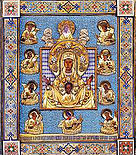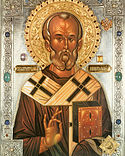Archbishop Andronik’s Nativity Epistle
The Nativity Epistle of Archbishop Andronik
Glory to God in the highest, and on earth peace, good will toward men.[1] These words spoken to the Bethlehem shepherds, became part of the gospel of world peace. And what is God’s favor? – this is the relationship of God towards man, which manifests itself through his love, forgiveness and mercy: This is the love of the Heavenly Father toward earthly man. Saint Theophylact of Bulgaria, in his interpretation of the Gospel says: “The Son of God Himself is Peace. For He says, ‘I am Peace.’[2] Know then that Peace itself, the Son of God, has come on earth. And Good Will is among men, that is, God in His good pleasure has chosen to abide among us. Now He is well pleased with man, when, before, He was neither well-disposed nor well-pleased with man.”[3]
And indeed, at that time, in addition to their daily worries, people were worried about how to please the Lord, how to fulfill the law. From the earthly life of Christ it is clear that many people first asked themselves how to fulfill the law, how to please God. But we see a different picture at the present time. Those who have been baptized in the name of Christ do not seek to fulfill the law, do not seek to please God, but think that by baptism alone they have already been saved, that: He that believeth on Him is not condemned.[4] From the explanation of St. Theophylact we know: “What is the meaning of the words He that believeth on Him is not condemned? Certainly not that a believer who continues to lead an unclean life will escape condemnation. Such a man is not a genuine believer; as Paul says, They profess that they know God, but [with their] works they deny Him.[5] Rather, the Lord’s statement implies that a believer will not suffer the punishment reserved for unbelievers; he must, however, give an even stricter account for sinful deeds committed after he came to faith.”[6]
The first coming of Christ was connected with God’s plan for the salvation of man. This was His goal, but was His goal achieved in us who believed and accepted His promise? Alas, unfortunately, no. At the present time there is no God-pleasing good will: neither in families, nor in parishes, not to mention states and nations. How bitter it is to observe that there is no favor either in the parishes or in the monasteries, which were created for only this one purpose – the joint pleasing of God. After two thousand years, Christians compete with each other in identifying the shortcomings of their neighbors, but the first Christians, on the contrary, compete with each other to see who sees more virtues and accepts them for themselves. We know many ways to save our neighbors, but we don’t use any of them on ourselves.
In our modern world, Christians often find themselves caught up in a competition of critics. Instead of looking for good qualities in our neighbors, we may unintentionally find their faults, and spend more time on this than on prayer. This tendency to highlight the shortcomings of others with the intention of “fixing” them was an unfortunate deviation from the path blazed by the early Christians. The early followers of Christ, guided by the teachings of love, compassion and understanding, took a different approach. They sought to see virtues in each other, to recognize the inner divine light. As the Apostle Paul teaches: That ye might walk worthy of the Lord unto all pleasing, being fruitful in every good work, and increasing in the knowledge of God.[7]
This is what we should do, helping each other, in the family and in parishes and in monasteries.
If Christ had not come, then people could plead ignorance of good, ignorance of how to fulfill the law. And when the God of the Word came and showed in practice how to fulfill the law, and the Evangelists left us a story about this in the Gospel to enlighten us, but we did not accept and do not fulfill this, then we are already deprived of all justification.
Let us, my dear ones, every time we hear the words: Glory to God in the highest, and on earth peace, good will toward men, ask ourselves – what kind of favor do I have towards God? Is my behavior glorifying God? Just as in ancient times there were wars and earthquakes and floods, so now also everything is happening before our eyes, however, as then as well, so now the goal of man was and remains – to please God. Let us remember the first Christians, who, in their zeal for the Gospel, sought not to criticize, but to glorify the virtues of their brothers. Let’s control ourselves, and not our neighbors, so that the Gospel does not fade into the background in our daily lives, so that, as in ancient times, it will be our Daily Bread. In doing so, we strengthen the bonds of Christian fellowship and embody the very love that Christ showed us.
I congratulate the God-loving flock of the New York and North American and Ottawa and Canadian dioceses, co-servants at the Throne of God, the Holy and Church servants of God, the elders of our parishes, those who work and sing in the Church of God, the staff of the Fund for Assistance, as well as the St. Blessed Xenia Fund and all teachers and students at the Theological School of St. John of Shanghai and St. Philaret of New York and at the school of St. Sergius of Radonezh, on the great Feast of the Nativity of Christ, and I wish everyone God’s help in spiritual labors from the Divine Infant Christ, who was born in Bethlehem.
+ Andronik
+ Archbishop of New York and North America
+ Archbishop of Ottawa and Canada
[1] Luke 2:14 KJV
[2] Luke 24:36 and Eph 2:14
[3] Blessed Theophylact: The Explanation of the Holy Gospel According to St Luke, Vol III, Tr. Fr Christopher Stade, Chrysostom Press, House Springs, MO 1997, p. 31
[4] John 3:18 KJV
[5] Titus 1:16 KJV
[6] Blessed Theophylact: The Explanation of the Holy Gospel According to St John, Vol IV, Tr. Fr Christopher Stade, Chrysostom Press, House Springs, MO 2007, p. 55
[7] Col 1:10

